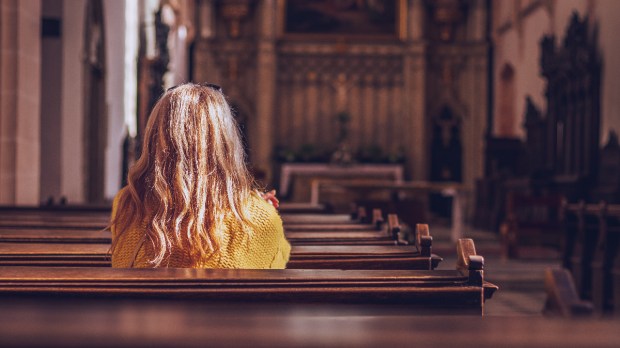“I just don’t want to deal with the Catholic Church anymore,” my friend’s husband Jimmy said. “I’m tired of how impossible they are to work with.”
I knew there had to be more to the story, so I asked him if he wouldn’t mind sharing why he felt that way. He explained that he’d volunteered on his parish finance council the year before.
At council meetings, the priest kept complaining about how few ceremonies took place at their large urban parish. “Only 10 weddings last year! Can you believe that?” he railed. His goal was to schedule many more weddings at the church.
James sympathized, until a few months later when his own son got engaged and tried to schedule a wedding at the parish. It turned out to be a harrowing endeavor!
First, the parish told the couple that there was absolutely no way to schedule a wedding over a year in advance. Then after they finally managed to get a date on the books, the parish somehow lost their reservation and claimed they had no record of it three months before the ceremony, leaving the couple frantically scrambling.
Understandably, the young couple and their families were peeved, so much so that they warned other couples away from scheduling a wedding at that church.
A problem that is too common
The disconnect between the pastor’s stated goal and his incompetent staff who actively hindered it was jarring. But sadly, it’s a story that’s all too common.
As I began asking around, I heard more and more stories like this one.
One friend shared that she could not get a response from her local parish about scheduling her baby’s baptism, even after several emails and calls, so she finally scheduled it at a different church.
Another friend told me that she and her husband had baptized six children at their parish and were very involved and faithful parishioners, but still were made to attend the mandatory baptism class in order to schedule the baptism of their seventh baby.
Speaking for myself, I’ve seen too many examples of similar bureaucratic incompetence. There was the time I tried to organize a “Catholic date night” at a local parish, including a speaker, dinner, dancing, and childcare provided. I didn’t receive a response from that parish for months, and when they finally got back to me offering to host it … the event had already taken place at another church!
Another time, at a different parish, I approached the pastor about starting a women’s faith formation group. He asked to meet with me and proceeded to grill me about my reasons for starting it, thinking that I must be trying to sell some kind of product to the women of the parish! It seemed unthinkable to him that all I was after was to grow in holiness in community with other women at the church where I attend Sunday Mass.
Let’s remove the obstacles
That’s really part of the problem, I think. It seems weirdly surprising to many administrators when the people in the pews sincerely desire grace and the sacraments.
So many parishes have become so bureaucratic and “by the book” that they’ve lost sight of their evangelical mission. The effect can be to prevent people from accessing the sacraments and other potential ministries, which is directly at odds with the entire purpose of a parish.
For example, the practice of “holding baptism hostage” is disturbingly widespread. Lauren Enk Mann writes for Catholic Exchange:
The parochial American church, wedded as it is to bureaucracy, throws up unnecessary obstacles for parents seeking this most necessary sacrament for their babies… bureaucratic tape between babies and baptism is an unalloyed wrong and grave injustice. Let these infants be baptized, and stop making it so complicated.
And it’s not just Baptism. There are similar horror stories regarding Confirmation and even for weddings.
One friend had to schedule her wedding at a church she’d never been to before because her local parish demanded an exorbitant fee for weddings and refused to waive it for her, even though she and her family had faithfully attended and volunteered at that church for many years.
Another friend says that her teen is not confirmed yet because her parish requires so many activities, meetings, classes, retreats and volunteer hours, over a year-long period, that it feels almost impossible to make it happen with their family schedule. While she acknowledges the need for proper preparation, the one-size-fits-all requirements seem overly burdensome and unnecessary.
When Catholics choose excessive bureaucratic procedures over spreading the Gospel, and following the letter of the law over the authentic promptings of the Holy Spirit, it’s hurtful and off-putting to the people in the pews.
It makes it seem as if Catholics don’t even believe what they claim to profess: If we truly believe in the power of the sacraments, why aren’t we bursting with desire to administer them as quickly as we can to those who desire them?
And frankly, perhaps that’s part of the problem, too. Perhaps people have forgotten these teachings and lost sight of the wonder of God’s grace in the sacraments.
The pope’s advice
It turns out Jimmy and I are not the only ones who have noticed a problem. Pope Francis himself spoke out against a “suffocating bureaucracy” that’s killing parishes. He said,
How many times we ourselves, priests or bishops, create so much bureaucracy to give a sacrament, to welcome people, that people say: ‘No, I do not like this,’ and they leave, and often they do not see in us the power of the Spirit who regenerates, who makes us new?
What a perfect description. As the pope alludes to, there are many sad stories of people who fell away from the Church after facing extreme and legalistic obstacles to the sacraments.
So what can be done?
If your local parish seems to be struggling, it’s time to take an honest look and ask, “Are we putting up excessive obstacles to people accessing the sacraments?”
If you’re a pastor or parish administrator or employee and you’re worried that bureaucracy is killing your parish, here are a few questions to ask yourself…
- What would we need to do to make it as easy as possible for parishioners to access the sacraments, while exercising a spirit of prudence?
- How can we streamline these processes? How can we work with parishioners and meet them where they are? (For example, you might allow an online class, or offer a homeschool option for religious education.)
- What is it like for people in the community to schedule their sacraments with us? Was our parish responsive, attentive, communicative, and helpful?
If you’re not sure, ask people who have recently received sacraments at your parish. And take what they say into serious consideration.
If you find out there were serious obstacles and your staff was unhelpful, it may be time to hire someone new or retrain your staff. You can make use of the latest technology that was designed to help parishes reach their parishioners more effectively.
It should be reasonably straightforward to access the sacraments. When it’s not, the unintended consequence can be pushing people away from the Church. No one wants that, so let’s make sure our procedures, communication, and requirements are in line with our mission.



